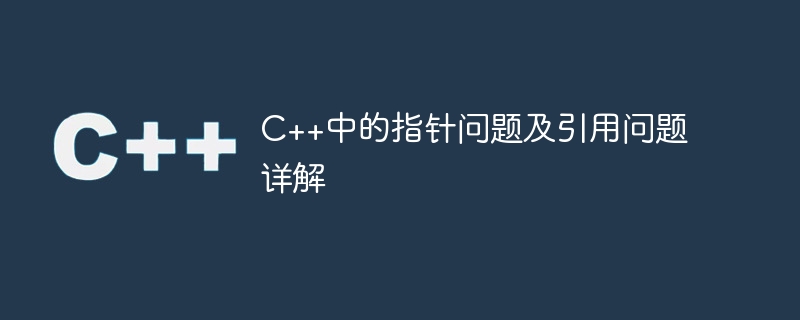

Detailed explanation of pointer issues and reference issues in C
In C programming, pointers and references are two very important concepts. They can be used for indirect access to variables, improving program flexibility and efficiency. However, pointers and references are also prone to causing some problems. This article will explore these issues in detail and provide specific code examples.
Pointer problem:
int* ptr = nullptr; // 初始化为空指针 *ptr = 10; // 试图访问空指针,会导致程序崩溃
Solution: Before using a pointer, ensure that the pointer has been properly initialized or assigned a value.
int* ptr = new int; // 分配动态内存 delete ptr; // 释放内存 *ptr = 10; // 试图访问已释放的内存,会导致未定义的行为
Workaround: Make sure that after freeing the pointer, it is no longer used for access.
void func() {
int* ptr = new int; // 分配动态内存
// 在这里没有释放指针
}Solution: Ensure that the memory allocated through the new keyword is released by the delete keyword when it is no longer needed.
Reference problem:
int& ref; // 引用未初始化 int x = 10; ref = x; // 试图赋值给未初始化的引用,会导致未定义的行为
Workaround: When defining the reference, make sure it is initialized correctly.
int* ptr = nullptr; int& ref = *ptr; // 试图引用空指针,会导致未定义的行为
Workaround: Make sure that when you define the reference, it refers to a valid object.
int* func() {
int x = 10;
return &x;
}
int& ref = *func(); // 引用指向一个已经被销毁的对象,会导致未定义的行为Workaround: Make sure the object pointed to by the reference is valid for as long as the reference is used.
To sum up, pointers and references are very useful tools in C, but they can also easily cause some problems. When using pointers and references, we should pay attention to their initialization and validity, as well as release dynamically allocated memory to avoid pointer problems and reference problems. Only by using pointers and references correctly can we better utilize their advantages and write high-quality C programs.
The above is the detailed content of Detailed explanation of pointer issues and reference issues in C++. For more information, please follow other related articles on the PHP Chinese website!




